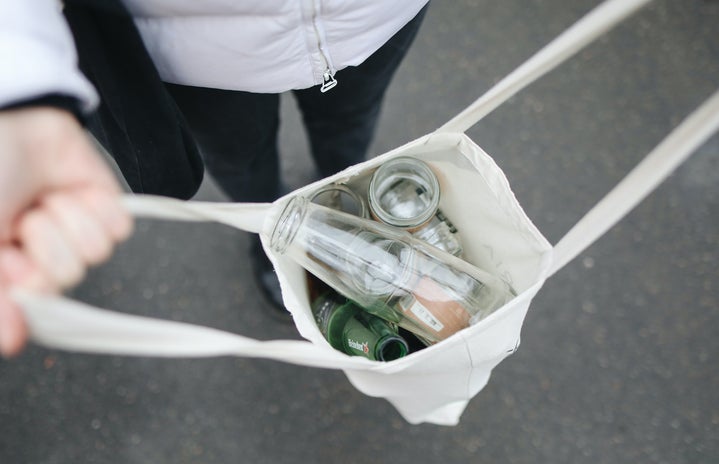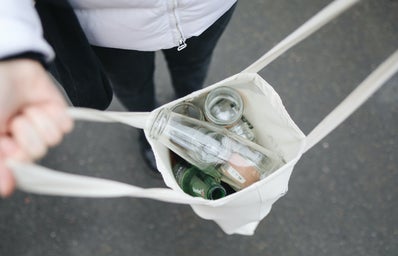There are a lot of products that can hurt the environment, some more than others. A handful of notable products that hurt the environment are listed below, along with some of my favorite alternatives for them. Just like everyone else, I am learning more and more about how to be eco-friendly, and I am so excited to continue to improve my consumption habits.
- Disposable Razors
-
Disposable razors have high costs for you and for the environment. These razors are mostly plastic and have razor heads that are pricey to replace. You can avoid throwing away tons of razor heads (and dollars) by investing in a metal razor. There are razors of different prices, and some have better tilting heads than the plastic razors! More importantly, when it is time to change the blades they are inexpensive, metal and can be recycled. Most plastic razors have special linings on the top of the head that are “moisturizing,” but they just cause the razor head to need to be replaced sooner. Metal razors might start out more expensive, but over time you will be spending less money by not having to purchase those costly razor heads.
- K-Cup Pods
-
K-Cup pods are one-use only and go right in the trash when you are done with them. They are also expensive and limit your drink choices. There are many other coffee-making alternatives that you could use like pour overs, french presses, filter coffee pots and more. If you are attached to your Keurig, they sell reusable pods so that you can put any kind of coffee or tea in it that you want. Buying one of these can help the environment and your wallet by eliminating the continuous purchase of single-use K-Cup pods.
- Toothbrushes
-
Every toothbrush that you have used throughout your life is still in existence, it’s just sitting in a landfill. There is no need to have so much plastic. You can buy toothbrushes that work just as well but are made out of more sustainable materials, such as bamboo. That way when you do replace your toothbrush, it isn’t adding to the mounds of plastic in our landfills.
- Plastic Bags
-
Everyone knows that plastic bags are bad for the environment, but it is estimated that between 500 billion and one trillion are used worldwide each year. Plastic bags take 500+ years to decompose, and the bulk of the bags end up in landfills. Plastic bags are made from petrochemicals that use non-renewable fossil fuels and create greenhouse gasses during production. You can find cute reusable bags on Amazon or opt for paper bags at the store.
- Dryer Sheets
-
Dryer sheets are good for your clothes but are terrible for the environment. Dryer sheets are thrown away after each load, whereas other alternatives, such as dryer balls, can be used again and again. There are many different kinds of dryer balls, and they work just as well as dryer sheets. If you like the scent that dryer sheets add you can get wool dryer balls and add essential oils on them. Personally, I have little hedgehog shaped dryer balls, and they are too cute!
- Paper Towels
-
Tons of paper towels are used everyday, which is harming the environment and causing consumers to buy pack after pack. Instead of buying paper towels you can use rags, or my favorite swedish dishcloths. These cloths are nice, because they replace paper towels, have fun designs and can be washed and used again.
- Sponges
-
The common dish sponge can take hundreds of years to decompose and give off tiny plastic particles that get in our water and can affect our health. Most people will go through two sponges a month, while the biodegradable alternative will last four months minimum. These sponges may seem more expensive at first but you will be buying less than you would if you bought the cheaper plastic sponges. You can buy eco-friendly and biodegradable sponges from various websites and stores. There are tons of alternatives, such as walnut scrubber sponges from Public Goods, reusable “UnSponges” from Etsy, bamboo pot scrubbers, biodegradable sponges, natural loofahs and so many more.
- Plastic Water Bottles
-
~1,500 plastic water bottles are being consumed every second in the U.S. Buying single-use plastic water bottles is a very easy habit to break. Start carrying a water bottle with you when you are on the go. When you do buy a reusable water bottle try to find one without BPA, because it is linked to several health problems. If you know or think you may run out of water you can purchase a bottle with a filter so that you can refill water in any tap.
- Disposable Cutlery
-
Disposable, plastic cutlery will come with your meal, but it is unnecessary. You can buy or DIY your own travel cutlery kit. This way, you won’t need the plastic cutlery that comes with your to-go meals. Just make sure to ask the restaurant to not include the disposable set.
- Produce Bags
-
When people think of plastic bags they usually think of the ones at checkout, but forget about the ones by the produce. Most fruits and produce either have their own peels that you won’t eat or are cleaned before being eaten anyway. If you don’t want to put your produce into the cart, then you can find inexpensive reusable bags that you can wash after use, and then use next time you are at the store.
After learning about eco-friendly alternatives it can be tempting to go out and buy a bunch of them, but it is important to use the rest of what you have. I am still going through my plastic disposable razor heads and using the last of my paper towels, but I am excited to make the switch to these more eco-friendly replacements.
**If you want to read more about eco-friendly alternatives, I found my information on onegreenplanet.org.



